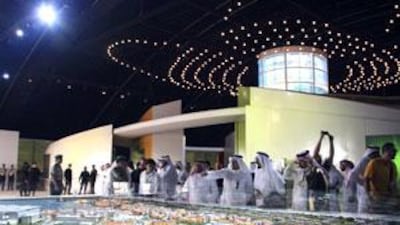JEDDAH // King Abdullah's decision to relieve a senior scholar of his duties has disappointed intellectuals and rights activists, and raised questions about both the level of extremism in the Saudi liberal stream and the place of secularism in the ultra-conservative Islamic kingdom. King Abdullah issued a royal decree on Sunday relieving Sheikh Saad al Shethri, a young university professor who was appointed this year to the Council of Senior Islamic Scholars, of his duties as a member of the council and the fatwa-ruling body.
The king's decision came a few days after liberal newspapers and writers condemned Sheikh al Shethri for his controversial statement last week on the al Majad Islamic TV channel questioning the appropriateness of co-education at King Abdullah University of Science and Technology (Kaust) and calling for a Sharia committee to monitor the compatibility of studies being conducted at the international university with Islamic law.
The campaign was launched on September 29 in a column by Jamal Khashoggi, the editor in chief of Al Watan, a reform-oriented daily newspaper, condemning the sheikh and the television channel in which he appeared. The following day, the editors of other major newspapers joined Khashoggi and several opinion pieces were published in the kingdom's five major dailies condemning the scholar. "The controversy that followed Sheikh al Shethri's statement and the organised media campaign that targeted him showed that the Saudi society is going through a stage of intellectual imbalance," said Saud Kateb, a liberal writer and professor of media technology at King Abdul Aziz University in Jeddah.
"Society is facing one of its most dangerous phases as moderates are diminishing and extremism is on the rise both on the Left and the Right," he said. "The liberals are becoming extremists just like the conservatives and what happened is a setback for social development in the country." Prof Kateb said liberals are using the same tools conservatives used previously. "Eliminating the opposition, provoking political authority to oppress the rights of others to present their views were things the religious extremists used in the past, but now even the liberals are resorting to these methods," he observed.
"The media campaign against Sheikh al Shethri is against free press and liberal principles that we are calling for and against all what I'm trying to teach to my media students," he added. Wael abu Mansour, a Saudi journalist, said Sheikh al Shethri chose the wrong moment to raise religious concerns about the university. "The whole country was celebrating the king's university, the national mood was positive about the future of the university, and he raised an issue which is minor, or even not important at all in my opinion," said abu Mansour, who works for Al Watan.
Walid abu al Khair, a human rights activists and lawyer, also condemned the media campaign against Sheikh al Shethri. He said the cleric had expressed his views in a peaceful manner and had not tried to provoke the public's anger. "From a constitutional point of view, the king has the power to remove him if he said something that is against the 'general will' of the government, but from a human rights point of view, Sheikh al Shethri was exercising his freedom of speech," he said.
"This is the second time the king has used the power given to him by the constitution to end an issue that caused great controversy in the media between liberals and conservatives and in both cases the group that had the greater voice was the group that won in the end." After huge international protests in 2007, the Saudi king pardoned an al Qatif girl, a victim of a gang rape who had been sentenced to lashes and imprisonment for being in a parked car with a man with whom she was having an illicit affair.
"Rights shouldn't be only given to the party who has the larger voice in the media," Mr abu al Khair said. The removal of Sheikh al Shethri also triggered concerns among conservative intellectuals who see in the event a move towards the secularisation of society. Abdul Aziz Qassim, a conservative columnist at al Watan, wrote on Sunday that the important issue at hand was that many were reviving a secular argument that called for the separation between religion and science; however, the king's vision was for an advanced technological university in a religious society.
Kaust, officially opened by the king on September 23 in the presence of several world leaders and renowned scientists and academics, is located in Thuwal, a small village on the Red Sea, about 80km north of Jeddah, near King Abdullah Economic City. It was built at a cost of 10 billion riyals (Dh9.8bn). The university, which focuses on scientific research and offers master's and doctoral programmes in applied sciences and engineering, boasts faculty members from 80 countries. Its students come from Saudi Arabia and other Gulf and Arab states, Europe, North America, East Asia and South Africa.
The university is a dream project of the Saudi king, who wants to transform Saudi Arabia into a knowledge-based society and economy, and has pushed for wide social reforms. Speaking at Kaust's opening ceremony in 2007, King Abdullah said: "The establishment of this university has been a living idea in my mind for more than 25 years and I thank God for helping us to realise it." King Abdullah said he wanted Kaust to represent the Islamic golden era of scientific discovery and for this cause he allocated an endowment to meet the university's financial obligations.
"Kaust will serve the people of the kingdom and benefit all the peoples of the world in keeping with the teachings of the Holy Quran, which explains that God created mankind in order for us to come to know each other," the king said. @Email:wmahdi@thenational.ae

